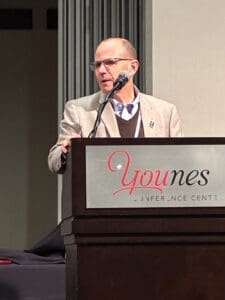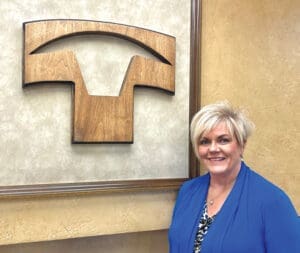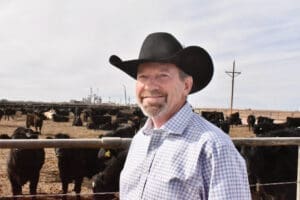By Patti Wilson, Contributing Editor
Fullerton rancher Eric Frenzen has found success in succession. The third generation to tackle the family purebred cattle business, Frenzen has stepped into a big job, with grateful parents and cooperative siblings.
The Frenzens are famously family oriented. Eric’s grandfather, Clarence Frenzen, farmed and ran a commercial cow herd north of town in the 1950s with his wife and two sons, Marlin and Galen. The two boys were given Hereford heifers for 4-H and FFA projects in 1957, and a new family business was born. The switch was made to Polled Herefords shortly after; they are still part of the cow herd today.
Fast forward to 2022, and the ranch is intact and doing well. Clarence and Marlin have passed away, but Eric’s dad, Galen, and his mom, Gwen, have managed a smooth transition for their offspring.
An Unconventional Beginning
Eric loves football, it is the great passion in his life. After a successful high school career, he secured a four-year football scholarship at Midland Lutheran College (now Midland University) in Fremont, Neb. Frenzen was not only an athlete, but he was ambitious enough to earn his business degree a semester early.
He returned home in January 2002 in time to start calving. As fate played out, it was a long, difficult season. Somewhat discouraged, he realized an animal science degree would have perhaps served him better, and he needed time to think. After a serious talk with his folks, it was decided that Eric should go back to school, this time at the University of Nebraska (UNL), to get a more suitable degree for his path in life. Eric credits help from an excellent advisor, Dennis Brink, and was finished with the required classes in two years. This time when he came home, he was ready for anything. Eric says it was truly a “growing process.”
Family Contributions
Each member of the Frenzen family contributes to the success of the farm and ranch. Eric is the designated manager of the breeding program for nearly 600 mother cows. He does the AI work and supervises daily activity outside. Galen is the financial principle of the property; he pays bills and runs the feed wagon at every opportunity. Gwen walks pens daily and is in charge of health checks.
Eric’s sister, Genna Frenzen, is his right hand, helping daily with every aspect on the ranch. She keeps all the cow records. Genna’s a talented cattleman and experienced fitter, valuable in sale bull prep. In addition, she’s been the main fitter “back in the barn” for several outfits showing cattle successfully at large venues. Her daughters, Kiera, 12, and Kinsley, 9, are deep into showing Frenzen-bred heifers, and are valued members of the team, helping on a daily basis. “They mean all the world to me,” Eric says.
Another sister, Tessa Adams, lives close by. Although she and her husband, Cody, run a separate cow herd, Eric says she’s cheerfully available to help on difficult days. Their daughter, Austry, 9, is also showing Frenzen heifers, and they are raising F1 baldy heifers for the family production sale.
John Wardyn of Fullerton has been employed by the family for years; he’s deeply appreciated and extremely busy.
The Cow Herd
The Frenzen herd consists of two-thirds Angus and one-third Polled Herefords. About 350 cows are spring calvers, and the balance calve in the fall. Previously exclusively Polled Hereford, the Frenzen herd began to change complexion in 1979 when Galen married Gwen Logan, an Angus breeder and former Nebraska Angus Queen. Black cows are now a staple of the herd, as well as able recipients of embryos. Five or six cows are flushed annually, with the ranch providing their own recips. An annual production sale the fourth Tuesday of March provides the ranch’s main income. It has been running for more than 35 years.
The farm raises a majority of their feed but purchases some hay, depending on the severity of the winter. The cows spend the winter months “roughing it” on cornstalks and are supplemented later with alfalfa hay when that resource runs out. The bulls are developed on distillers grains, low-quality hay and dryland corn silage (virtually no starch).
A Lifelong Love
Eric was somewhat sad when his collegiate football career was over. Some may say he was despondent. Being dedicated to the weight room and running miles a day defined his life; after college there seemed no point in it.
Local folks were paying attention, however. When Eric spent two years in Lincoln getting his animal science degree, he landed a coaching job at Raymond Central High School. The experience was so gratifying, he considered coaching as a career. Nonetheless, he marched home to Fullerton and cattle.
Neighbors at home met him with open arms and he soon became the defensive coordinator of the Fullerton High School football team. Eric glows when he speaks of the teams he’s coached over the past 12 years. He says he’s now coaching the kids of role models he looked up to as a youth. He understands the local culture and the families there, and can handle his players as he knows best.
Future Goals
Eric’s goals for the future include expanding the cow herd. He says that resources are maxed out and additional grass is not readily available. He wants to “get better at marketing.” A step forward on that front is hosting an online sale in December, featuring bred heifers and frozen genetics. Live bull sales with cattle in the ring, as opposed to a video screen, will continue. People like to see what they’re bidding on.
Eric asserts they are not raising show stock, but their junior family members show good, sound heifers and the exposure helps sales at home.
Reflections on Life
A recurring story kept coming up during our visit. Eric says that, during his time at Midland College, he had a teacher, a California native, who simply wouldn’t leave him alone. Eric was badgered daily about agriculture. He was questioned and harassed by the liberal arts instructor, and not in a nice way. He could not figure out “where this guy was coming from.” As a result, he realized most people’s complete disconnect from agriculture. This was a teacher who, for good or bad, had a lasting effect on one of his students. I guess that is what most teachers wish for.
Another thought he wanted to convey involved a long day of work on a Good Friday. Tired, Eric went to church in the evening and got home at dark, ready to collapse with exhaustion. The phone rang. Folks, you know where I am going with this because we have all been there. It was his parents. There were 100 pairs out. The hay-weary cows had discovered tender, green shoots in the road ditch and had found their way into newly planted fields. Eric describes the frustration and misery of chasing pairs in the late, dark night – pairs that were delighted to be on the loose. He and his parents were the only ones home to mitigate the trouble, and his parents, although great people, are not spring chickens. After getting the cows gathered, they fixed fence.
His takeaway from this story is one he wants you all to remember: Don’t quit. Ever.
“You have to have a Good Friday before you can have an Easter Sunday,” he quips. We all have bad days, and we simply have to get through them the best way we can.
Pretty sage advice from our young stockman.





